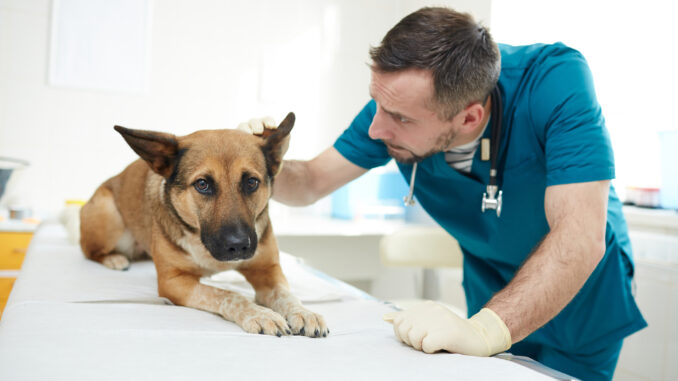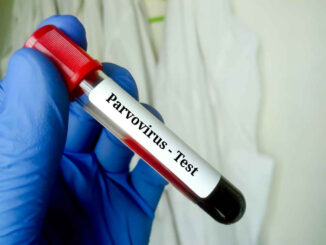
This article was updated on December 12th, 2022
Parvo is often thought of as strictly a puppy problem, and not much worry is put into protecting our adult dogs from getting it. Even though parvo is more likely to get into that 8-16 week age group, no dog is completely free of risk; adult, senior or otherwise. Most of the time, older dogs won’t get as sick as young puppies, but it can still be a significant disease. Let’s look into how adult dogs get parvo and ways you can prevent it.
What is Parvo and Can Adult Dogs Get it?
Parvo is a disease caused by parvovirus. It attacks the linings of the intestines, causing digestive issues such as diarrhea and vomiting that can lead to dehydration. Parvovirus is nearly everywhere in the environment. It is very contagious and transmitted through infected feces, ground, or dog-to-dog contact. This means any dog that comes in contact with another dog’s infected feces, the ground that it’s been on, or the dog himself is at risk of contracting the disease – even adult dogs.
But that doesn’t mean that every dog that comes in contact with parvovirus is going to get parvo. Young puppies are most susceptible due to their developing immune system that can’t fight off the infection. Usually older dogs, either through vaccinations or exposure, develop some immunity to the virus so that infections don’t become as serious. Adult dogs that haven’t been properly vaccinated are more at risk.
Another group of dogs that are especially susceptible are immunocompromised animals. These are dogs that have some dysfunction in their immune system so that it doesn’t provide the protection that they need.
Most cases of parvo in adults are milder than those seen in puppies simply because they are stronger and have a more developed immune system.
How Do Adult Dogs Get Parvo?
Adult dogs can pick up parvo in the same places that puppies would. Those are mainly areas with a lot of dog traffic, including dog parks, kennels, hiking trails, grooming facilities, and veterinary clinics. Parvo is a tough virus to kill and requires a strong bleach solution to completely neutralize it. This just means that it may survive ordinary cleaning regimes. Without proper immunity, adult dogs can still contract parvo.
Is Parvo A Serious Concern with Older Dogs?
Most of the time, cases will be milder than those in puppies, but can still be fairly serious. Immunocompromised dogs are the other susceptible adults. These dogs just lack an adequate immune system to fight off common diseases like parvo. Cases in these adult dogs can be very severe.
Unvaccinated or improperly vaccinated adult dogs are most at risk.
Signs and Symptoms of Parvo in Adult Dogs
Often, the first sign that you may see of parvo in an older dog is lethargy and not wanting to eat. That may then progress to a fever and vomiting and diarrhea, often with a strong smell. Diarrhea and vomit may also contain blood.
Eventually, parvo leads to dehydration and starvation because the digestive system can’t absorb enough water or nutrients and lots of fluid is lost through the diarrhea and vomiting. The decrease in white blood cell production also inhibits the immune system so that it can’t fight off the virus as effectively. All of this can lead to shock, organ failure and death.
Dogs that die from parvo typically die of dehydration or shock.
Parvo symptoms can come on very quickly and rapidly become severe. Because of this, it’s very important to get treatment as soon as possible. Only the mildest cases will respond to home treatments, the majority of dogs with parvo are going to need veterinary care.
Click here to learn more about Parvo Symptoms in Adult and Senior Dogs.
Diagnosing Parvo in Adult Dogs
Some cases of parvo in adult dogs may be mild enough that you don’t pay much mind or they go unnoticed completely. Others may require some veterinary care. For adult dogs that have vomiting and diarrhea with no known cause may be administered a parvo test. These tests use feces or a rectal swab and take about 10 minutes.
Sometimes the vomiting and diarrhea resulting from parvo can have a tell-tale odor. Having this foul smell may warrant a veterinarian to do a parvo test.
Are There At-Home Treatments for Parvo?
Most of the time parvo requires veterinary care. However, since adult dogs tend to get milder cases, you may be able to take care of some of it at home. Of course, don’t hesitate to see your vet if your dog’s signs get worse or if they continue for longer than 48 hours.
Hydration
One of the biggest concerns with parvo is dehydration. When your dog has vomiting and diarrhea and isn’t drinking much water, they can quickly dry out. As long as your pup has only mild vomiting and diarrhea and is still willing to eat and drink, encourage fluids. Be sure to have plenty of fresh, clean water around. You can even add a little low-sodium chicken broth to the bowl to entice him further. Giving ice cubes is another great way to increase water intake. Some dogs will make a game out of chasing and eating them.
Bland Diet
Parvovirus attacks the cells of the intestinal lining, among other things, so giving your dog’s digestive system a break with a bland diet can help him heal. A little boiled chicken and rice given in small amounts every couple of hours can help give him energy without overworking his guts. Adding a little water can make it more appealing and increase fluid intake as well.
Rest & Relaxation
Parvo is no fun, even mild cases of it. Give your dog some space and allow him to lounge for a few days with few expectations. Make sure he has a cool, quiet spot and let him catch up on his beauty sleep.
Quarantine
Parvo is a contagious virus that can live for years in the soil, so be sure to not only keep your pup away from other dogs, but keep their feces away as well. Use a strong bleach solution to clean up after them and to disinfect beds, water and food bowls, etc.
When to Visit a Vet for Parvo in an Adult Dog
Parvo can turn ugly pretty quickly, even in an older pup. With this in mind, closely monitor your dog for other signs or for those signs to get worse. See your vet if your dog has any of the following.
- Vomiting or diarrhea lasting longer than 48 hours
- Vomiting more than 2-3 times per day
- Not eating
- Fever
- Bloody diarrhea
- Lethargy
- Stomach pain
- Dehydration
- Any time you’re worried
If your vet suspects that your pup has parvo, they will run a parvo test using a fecal sample or a rectal swab. They will then treat with fluids and supportive care, including anti-nausea meds, antibiotics, pain meds, and antacids. Really sick dogs may need hospitalization in order to continue fluids and monitoring.
Cost of Treating Parvo by a Vet
Fortunately, most adult dog cases of parvo are less severe than what a puppy might get, so hopefully treatment won’t be as involved either. However, look to spend $300-$1,500 at the vet clinic to treat parvo. Fluid therapy and supportive medications can be expensive, and if hospitalization is required, you’ll be looking at the upper limits.
Some pet insurance policies might not cover parvo treatment if a dog isn’t vaccinated, so be sure to check into your particular plan.
The Prognosis of Adult Dogs With Parvo
The good news about parvo is that is has a very high survival rate with early treatment-around 90%. The other good news is that adult dogs usually fair better than young puppies because their immune system is more developed. That being said, dogs that are immunocompromised may have a lower survival rate or are more likely to recover but have lingering immune issues.
Parvo will run its course in most dogs in about a week. This is mild cases or severe cases with treatment. Of course, there will always be a few that have a tougher time of it and take longer. Most dogs that recover from parvo will develop lifelong immunity and be completely normal. Some dogs may have lingering issues, such as chronic digestive issues. This is truer with severe infections or in dogs with other health conditions.
No dog is safe from parvo, no matter what age. Being healthy and vaccinated is a dog’s best chance at avoiding or surviving a parvo infection.
How to Prevent Parvo in Adult Dogs
Of course, prevention is always the best medicine, so rather than having your adult dog go through parvo, let’s do our best to prevent it.
Vaccinations
Having your dog up-to-date can drastically decrease his chances of getting parvo. No vaccine is 100% effective, so even properly vaccinated dogs may contract parvo if exposed to it. Usually they will have a milder case and quicker recovery however. Dogs need a series of three parvo shots given every four weeks starting at around eight weeks of age. They then need a booster one year later and every 1-3 years after that depending on their lifestyle and your veterinarian’s recommendations.
Avoidance
Dog parks and other areas of heavy dog traffic are the perfect places for parvo to be transmitted. Avoiding these places, especially if your dog isn’t fully vaccinated or has another health issues, may help avoid parvo. Stay away from other dogs that are sick or have been exposed.
Clean Up
Remove feces from your yard and your dog’s area. Only use boarding or grooming facilities that are clean and have a good disinfection protocol in place.
Keep Him Healthy
Feeding a high-quality dog food, getting lots of exercise and regular veterinary care will help your dog live a healthy life, one that is hard to parvo to disrupt.
FAQ
Can a vaccinated dog spread parvo?
Vaccinations aren’t 100% effective, so even fully vaccinated dogs can get the disease if exposed. They can also shed the virus in their feces just like any other contaminated critter.
Can a senior dog (8+ years) get parvo and how does that impact chances for recovery?
Dogs of all ages can get parvo. However, older dogs, especially if they’ve been vaccinated, tend to get a milder form. The chances of recovery from parvo rely more on how healthy a dog was beforehand and how early treatment was. This means that an older dog that was otherwise healthy and receives proper treatment has an excellent chance of surviving.
Are dogs with parvo in pain?
Parvo can be painful. It can make eating and drinking painful. Severe dehydration can also cause muscle pain.
Can a dog get parvo twice?
Most dogs that recover from parvo have a lifelong immunity to it. However, the parvovirus can mutate which allows for a reinfection. Dogs with immune issues may not create a long-term immunity and can get infected a second time.
Which dogs are most susceptible to parvo?
Young puppies and immunocompromised dogs are most susceptible to parvo because of underdeveloped or malfunctioning immune systems. Unvaccinated adult dogs are also at a higher risk.
Is parvo airborne?
No, parvovirus is transmitted through close contact with other dogs or with infected feces.
Related posts:
What Does Parvo Poop Smell Like?
Disclaimer: This website's content is not a substitute for veterinary care. Always consult with your veterinarian for healthcare decisions. Read More.



Be the first to comment